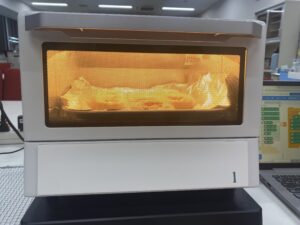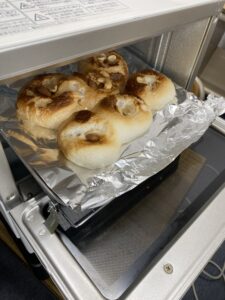Programming education has become compulsory in elementary schools and is also gaining worldwide interest in early childhood education.
Programming may sound very difficult, but don’t worry. You can have a lot of fun with it. Not just fun, but serious and enjoyable.
I would like to introduce a programming workshop we recently held at a seminar.
This is a workshop using a programmable home appliance that is being researched in collaboration with Panasonic. Three heaters (far-infrared and near-infrared) in the oven can be programmed and controlled using a programming environment based on Scratch.

I found marshmallow cookies by looking for something easy to experience. You place a large marshmallow on a baking sheet, top it with nuts, and bake.
The recipe I found on the internet said to preheat the oven to 150 degrees, bake for 5 minutes, top with nuts, and bake for another 15 minutes at 170 degrees. First, we will figure out how to express this in the program.
Then I got the oven going, and when it was done preheating, I realized that I had put the marshmallows in while it was preheating. It was different from the original program, but I kept baking anyway, keeping an eye on it, and the first batch was done. The outside was browned and the inside was soggy.

I got myself together and baked it the second time, properly preheating it and following the program. This time, it baked well.

It is an interesting experience to be able to eat what we programmed and created. In other words, it may be a rote bread-like experience of eating and owning the programming experience and learning.
What I felt as I watched the students was the quality of the setup. From preparation to actual work, tasting, and cleanup, they skillfully shared the workload without anyone having to say a word. I was reminded of last year’s graduate thesis on social skills in early childhood programming education, which was published in the OECD report “The state of the field of computational thinking in early childhood education” in 2022. The OECD report “The state of the field of computational thinking in early childhood education,” published in 2022, also cites the nurturing of social skills as an effect of programming education for young children, and further back in the 1980s, a book by Masaru Murakami, a leading-edge practitioner of childcare in a kindergarten in Osaka, titled Pipi from Outer Space: Kanaoka Kindergarten’s Computer Introduction Project”, written by Mr. Masaru Murakami, who practiced cutting-edge childcare at a kindergarten in Osaka in the 1980s, describes how children wait for their turn to use the computer.
Back to the story, on the third try, to my surprise, I stopped the program and stopped baking halfway through.
The reason was that it looked better now that it had puffed up nicely. Changing the plan (program) flexibly instead of following the plan may be a thought that can be gained through more advanced programming.
Finally, without the help of my assistants, I would not be able to realize these seminars and classes remotely.
Thank you for everything!
